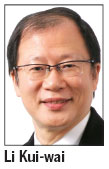Four pillars to support the future of Hong Kong's economy
Updated: 2013-06-11 07:40
By Li Kui-Wai(HK Edition)
|
|||||||

There have been a number of concerns in the local economy. Typical examples include the need to aid the poor, the elderly, rising property prices and the erosion of people's ability to own a property, especially for those born after 1980. The relevant question is why these concerns have emerged. One explanation is the burst of the economic bubble in 1997 and the subsequent economic crisis that lasted until 2005. After the Asian financial crisis, the number of high-income earners dropped. Short-term economic rescue concentrated on government spending that was consumption-related rather than production-related. Jobs were not forthcoming despite the rise in fiscal deficit because there was a lack of investment initiatives, especially in the production sector that would have led to a rise in employment.
After 1997, many politically oriented civic leaders held a simple and naive view that Hong Kong should assimilate with the mainland's economy. The economic recession on the one hand, and the economic rise of the mainland economy on the other, could have persuaded some that it would be better for Hong Kong to take up policies similar to the mainland, not knowing that the development of the mainland economy has in numerous ways followed the Hong Kong style of market economy. It is true that economic integration is necessary, but Hong Kong should not only keep its own way of life, but should expand, extend and deepen its various advantages. Hong Kong's difference and economic advancement from that of the mainland is the best contribution Hong Kong can make to the country, to Asia and the global economy.
"Rome was not built in one day". Similarly, the economic mess we have cannot be attributed to a single reason. People in Hong Kong complained when they were at a loss and expected rescue and free-rides, but took advantage of the situation when they were gaining. We need a strategy of economic revival, one which is based on our strengths and advantages, and should be apolitical, serving both the short-term needs and long-term interests of the city.
Our short-term needs are to make sure appropriate assistance is given to the needy, and that property prices stabilize thereby promoting people's ability to own. The long-term interests include a healthy business environment so that both small- and medium-sized enterprises and large corporations can develop and promote employment, and a government that would lend support in the form of developing, systemic improvement and creating a means to improve our competitiveness.
Most importantly, we have to be ready on two fronts: economic rescue when crises strike and sufficient assistance given to the needy, and a balance in the policy so as to allow room for future expansion and promotion. Some fiscal resources will be needed for short-term spending, but other fiscal resources will have to be deployed to generate long-term prospects.
Such a policy requires a few fiscal pillars to provide economic sustainability. While it is a blessing to have a fiscal surplus, it would be wrong to squander it for political ends. Since the Hong Kong economy is particularly prone to financial crises and economic turmoil, one can systematically deploy the fiscal resources by establishing a "crisis fund" that can be used to rescue the economy in times of crises and difficulties.
A similar fiscal pillar can be established for the elderly. Fiscal resources in times of surplus can be used to establish an elderly fund to cater to the needy from the growing elderly population. Many elderly may have sufficient wealth and assets, but their life uncertainty would mean that no financial calculations could be accurate, and the elderly fund would act as the last resort that could ensure life certainty.
In the property sector, the government should take the initiative in aiding the user market. While an overall approach would be to re-zone for contemporary usage and increase the supply of land, the user market can be developed by revitalizing the "three-tier" structure of public housing for the low income group, Home Ownership Scheme (HOS) for the middle-income group and private-housing market for the wealthy group and speculators. As compared to the previous structure, one difference is that the government will be the owner of both public-housing estates and HOS occupiers.
Once these three aspects are taken care of, the fiscal framework could be conducted normally so that stability and long-term sustainability can be achieved. Promoting a market-friendly business environment, attracting new investment to help build up and expand our industrial, service and economic capacities would be seen as promoting opportunity, where jobs would be created and the rise in wages could result in a reduction in income inequality.
People in Hong Kong should feel more optimistic. While we should not lament the passing of the glorious days we used to have, one has to be more pragmatic and work on the existing advantages. We are not in a mess, but our concerns require a new strategy and courage to take up challenges. One should not count on the government, nor should we rely on government decisions. Let's exercise our right and freedom to the greatest possible extent positively. Such a four-pillar strategy should enable Hong Kong's economy to face the challenges ahead.
The author is an associate professor in the Department of Economics and Finance at City University of Hong Kong.
(HK Edition 06/11/2013 page9)